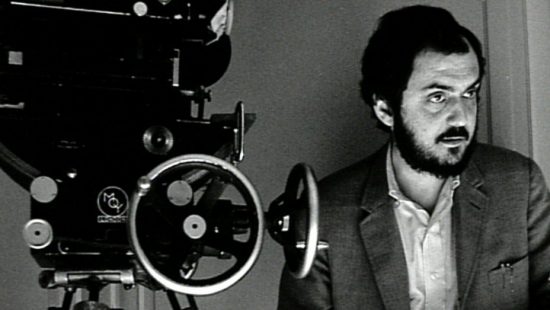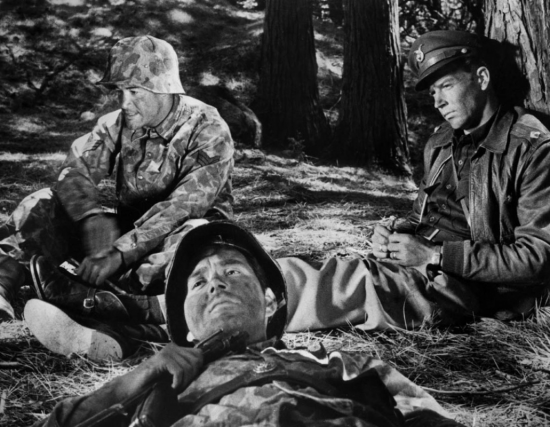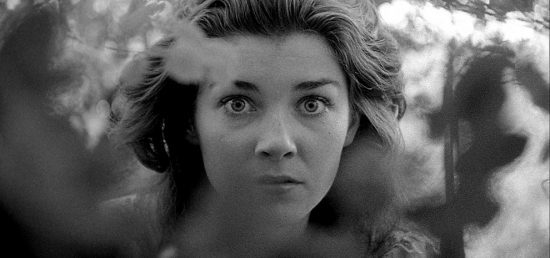Stanley KuBLOG: Fear and Desire – A Stanley Kubrick Retrospective
Stanley KuBLOG – The Man with a Camera and a Beard
Following the completion of the Steven SpielBLOG, it was natural to have a look around and wonder who to do next. Stanley Kubrick was the only choice really. Spielberg was fun, but Kubrick felt serious. Even that name. Solid, enigmatic, down to earth (Stanley?) but also unplaceable (Kubrick?) And there was the chronology. I came to 2001 A Space Odyssey very young indeed. I was a huge fan of science fiction and Arthur C. Clarke who I first encountered as the host of a documentary series Arthur C. Clarke’s Mysterious World which was a bit like the X-Files but with more sexual tension. Joking aside, 2001 marked me, it imprinted on me what cinema could be, could do. It isn’t necessarily my favourite film – though it is up there – it isn’t even necessarily my favourite Kubrick, but it was one of the first films to make me really understand what film could do and what it could uniquely do. By which I mean, even though there is a novel, 2001 does something that no other art form can do. It combines drama, music, poetry, an epic sweet, deep philosophical musings, speculation, even science and combines everything in a way that made me gasp when I first saw it and gasp when I last saw it.
Kubrick was born on the 26th of July, 1928 in Manhattan. He first made a name for himself as a photographer, talking his way into a position on Look magazine at a very early age and soon graduating to documentary shorts and then making his own films. Always fiercely independent, he eschewed studio involvement preferring to work with independent producers – initially his friend James Harris – before becoming his own producer and securing himself a deal with the studio that saw his independence guaranteed. His emigration to England also helped him maintain his independence and he insisted on absolute control not only of his films but of the marketing and this led him to acquire the reputation of a recluse, with a distinctly hands-off approach to the press. As the years passed, the gaps between the films increased. Expectation would rise as every release was now a major event and films like The Shining and Full Metal Jacket – which would later acquire great reputations – underwhelmed on initial release.
Personally, I followed his movies from my first experience of 2001 and on. A Clockwork Orange I could only see on a cruddy VHS pirate with Dutch subtitles. Watching the new Blu-ray version feels deeply wrong for some reason. The Shining was a film I watched and rewatched and like many became obsessed with it. Barry Lyndon took me a while to appreciate but is now firmly established as one of my favourite films of his. Full Metal Jacket was the first 18 rated film I ever saw at the cinema. I was 15. He was one of the first directors I read books about. The Michel Ciment book was a brilliant read. A series of long interviews which astounded me. Like Orson Welles, Kubrick thought deeply about what he was doing and the world around him and was genuinely fascinating on all levels.
His death came as a shock and just before his new film – Eyes Wide Shut – was due to be released. There was poignancy in seeing the film now, watching this strange hallucinogenic farewell. A film about sex, jealousy and the toxic dangers of a hyperactive imagination.
Even the title felt like a goodbye, a shutting of eyes from a man who had definitely opened mine.
Stanley KuBLOG: 1. Fear and Desire – A Stanley Kubrick Retrospective
Having made two short films to some success, a 25-year-old Look photographer decided to raise some money and make a feature film, because – after all – that’s where the money is. The result was Fear and Desire, a pretentious allegorical war story with some dazzling photography and flashes of promises.
Stanley Kubrick is on record stating how much he hated his debut feature. Not only did he bad mouth the film, he spent considerable time and resources hunting down negatives to destroy in the hope to wipe it out of existence. He likened it to the drawing a child would make and stick on his parent’s fridge. But this plea that the film should be regarded as unfiltered juvenilia neglects some important facts about the production. First of all, Kubrick was 25 years old. And a precocious talent already. Welles was only a year older when he made Citizen Kane. So it is hardly a work of callow youth. Secondly, Kubrick had control over everything. He raised the budget privately from relatives and with a small crew and actors was able to pretty much get what he wanted though the quality of the acting is fairly poor. But this is also his responsibility. The budget wouldn’t have risen that much to have a fairly decent bunch of thespians – actors are relatively cheap – and as for the script – the work of a school friend who he dismissed as a second rate poet – rewrites, again at this level, don’t cost much. Finally, Kubrick’s stated motivation to make money doesn’t chime with the finished product. Low budget films can still be crime movies, or horror films. There aren’t many allegorical, artily shot war films disturbing the box office.
The story of the film itself is quick to recount. A group of four soldiers are trapped behind enemy lines when their plane is shot down. They need to find their way back but first they capture a woman who they don’t know what to do with. A raft is constructed the soldiers can use to flow downriver and back into friendly territory but a general is spotted by the Sergeant (Frank Silvera, a regular TV and film actor who would accidentally electrocute himself at the age of 55 while trying to mend his waste disposal unit at home) and his wickedly powerful binoculars. He is taken by the idea of carrying out a high level assassination but the officer (Kenneth Harp) is more keen on the idea of getting away alive. Before this can happen the young private Sidney (Paul Mazursky who would go on to direct many a film including Bob & Carol & Ted & Alice) guarding the girl prisoner goes loopy, sexually assaults her, releases her and then shoots her dead.
Kubrick obviously is intent on the visuals. The effects of light and shade on the forest, the sharpness of the image, especially when it comes to photographing Virginia Leith as the peasant girl. Leith would later appear in The Brain that Wouldn’t Die and Starsky and Hutch. She only seems to be in the film to give the camera something else to do. Likewise an attack on enemy soldiers who are distracted by stew plays out as an excuse to film some heavily symbolic violence – wait until you see what happens to the stew!
It might be unfair to criticize the film seeing Kubrick has so roundly done so himself. But some of the criticism feels like foreshadowing of criticisms of his later more mature and certainly more successful work. A discomfort with women characters as anything other than something that men react to runs all the way through his work. The one-dimensional nature of his more conventional heroes is also something that we’ll see again as we progress. And even in its pretentiousness, there’s also a recognizable philosophy of a group of men lost and out of control both internally and externally. The madness which lurks on the edge ready to intrude is another consistent concern. There’s also the doubling of characters as the actor who plays the general is killed by the same actor playing the lieutenant. Our enemies are the people we see when we look in the mirror, I guess.
Whilst it would be foolish to read too much into Fear and Desire, Kubrick’s own urge to dismiss the film – indeed abolish it entirely to oblivion – shows perhaps that some of the weaknesses were not so much of youth but revealed more about him as filmmaker than he was altogether comfortable with.












